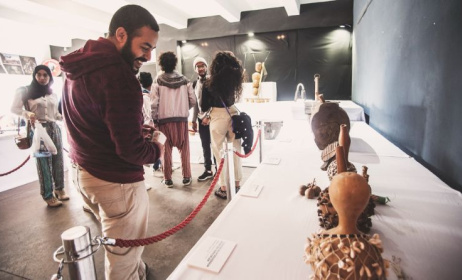Why research and statistics are vital for musicians
Existing research indicates that Africa accounts for a very small percentage of global music revenues, with a majority of musicians living in the larger part of the continent earning significantly less compared to their counterparts in other markets. Why does Africa lag behind in terms of music revenues, and what can be done to generate more income and investment in the music sector?
 The Music In Africa Foundation's Revenue Streams for African Musicians project will seek to provide reliable information for the music industry on the continent. In the photo: Aliou Touré of Malian band Songhoy Blues.
The Music In Africa Foundation's Revenue Streams for African Musicians project will seek to provide reliable information for the music industry on the continent. In the photo: Aliou Touré of Malian band Songhoy Blues.
As with most complex economic conundrums, the answer is a multifaceted one, and this challenge can be attributed to poor legislative practices, non-compliance, ineffective or outdated policies and trade agreements, lack of knowledge and infrastructure, poverty, piracy, mobility issues for artists (especially during crises like the COVID-19 pandemic) and others. In addition, much of the existing information at the disposal of African music professionals is based on anecdotal evidence and assumptions, and this translates into limited industry intelligence, which is key for development and growth.
The need for Africa-specific research to empower musicians
In fact, revenue streams for African musicians are largely understood and interpreted on the basis of global trends and notions suited for the international music market and not Africa, even though there are universally observable shifts such as the transition from the reliance on physical music sales to digital.
Notwithstanding, Africa and its many unique music markets – which can be subdivided into national, regional and continental levels – are in dire need for objective, credible statistics and tools that can be employed to empower music professionals (at independent level or otherwise) and the organisations working to improve the music business on the continent.
A lack of sufficient industry intelligence and statistics in the larger part of the continent makes it impossible to gauge the true state and value of the African music market; and effective strategies can be formulated only when there is statistical support about the various areas of the music business, such as distribution, royalty collection and income generation. In short, a rigorous examination of revenue streams in Africa is a prerequisite in the identification of a definitive and reliable framework available to musicians.
The Revenue Streams for African Musicians project
The Revenue Streams for African Musicians (RSFAM) project is the Music In Africa Foundation’s forceful attempt to analyse big data on the earning trends of music professionals in different African countries. Before the project is implemented on an Africa-wide scale, it will be run as a pilot in South Africa for 18 months starting in late 2020 by conducting research with findings that will be used to forge comprehensive revenue models that speak to practitioners and the wider music industry in the country. These models will then be used to create educational content and digital tools to support music professionals with reliable information they can adopt to fully maximise their earning potential. Additionally, the findings will seek to advocate for the development of legislation to support players in the local music industry effectively.
For updates, partnership opportunities and new research findings, visit the RSFAM website.
The Music In Africa Revenue Streams for African Musicians project is supported by UNESCO’s International Fund for Cultural Diversity in the framework of the UNESCO 2005 Convention on the Protection and Promotion of the Diversity of Cultural Expressions, the Siemens Cents4Sense programme, Goethe-Institut, the National Arts Council of South Africa and Kaya FM.
Connect with Music In Africa on Twitter, Instagram and Facebook, and subscribe to our monthly newsletter.



























Commentaires
s'identifier or register to post comments